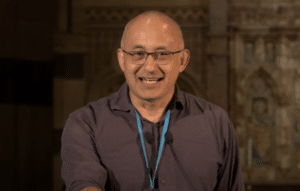
Gordon Preece
17 May 2024
Stephen Duckett, Health Care Funding and Christian Ethics: New Studies in Christian Ethics, Cambridge University Press, 2023.
The author of this imposing and attractive hardcover is a Melbourne Anglican lay reader, a son of the diocese, of which we can be truly proud. He integrates biblical faith, ethical thinking, the best of critical thinking and senior international experience. I can scarcely think of anyone better equipped to take on such a challenging and noble task. In the interests of full disclosure, I should declare that Stephen Duckett was also a member of the University of Divinity’s Centre for Religion and Social Policy which I led, and we are now members of its network. In fact, some papers contributing towards this book have been presented there.
Health has a ubiquitous presence in modern life. We ask people “How are you?” and the older we get the longer the answers become. But Duckett’s concern includes both this mutual interest in wellbeing and health, and the vexed questions of how mass-scale healthcare should be funded by enlightened and still-partly-Christianly-informed secular societies.
Read more: Healthcare policy: A biblical view
Duckett not only notes the bilingual nature of Christian public theology, but is an exemplar of it. His first chapter explains health economists, ethical practitioners and theorists to each other with the ease of someone who does this regularly. Duckett’s prolific pen’s produce is often found in the excellent, accessible platform The Conversation. To be able to sustain that ease for a PhD is a massive achievement. Duckett’s supervisor Professor Robin Gill is not exaggerating in saying that the book makes healthcare economics accessible to non-economists.
Duckett’s preliminary chapter deftly explains “the utilitarian frame of conventional economics” with a sympathetic treatment of the often-stereotyped Adam Smith, for whom “sympathy” or human connection is a critical aspect of the economic bread and butter of commodity exchange. This exchange takes place in the context of scarcity, the science of which is called economics. Scarcity is not only faced by individuals, but also by governments.
The balancing act that individuals and governments face in their budgets is, as former Sojourners director Jim Wallis used to say, due to their being “moral documents”. And fair distributions of the good of health, is a critical, though not easy, part of that. Duckett makes it clear that some kind of purely scientific homo economicus – “egoistic, rational, utility-maximising individual unit with no social interaction … is a fiction”.
The social nature of humanity and the common good nature of socio-political economics lead into “The Alternative Frame: Economics as a Moral Science”. Critical to this is the fundamental Christian humanist question of “Who is my neighbour?” The best answer to this is found in Jesus’ famous parable of the Good Samaritan. The Priest and the Levite, the very people expected to respond, failed to.
Read more: Healthcare workers likely to go elsewhere as isolation rules dropped: Chaplain
While Duckett’s exegesis and explanation of the parable is generally very good and clear, at one point I think it is lacking. Like a Bible study leader or preacher he asks who we identify with from the characters, and us to use each character as the basis for a principle of healthcare ethics. The Samaritan exemplifies compassion, the victim a call or cry for justice and inclusion, and the Samaritan and inn-keeper, the need for stewardship and good management of resources for ongoing care. This last interaction shows the importance of lay public theology, beyond the expertise or emotional reach of the Levite and Priest. But Duckett’s desire to reach for universal principles, doesn’t do enough justice to an ethics of proximity or nearness, in a particular place and time. Here clericalism failed and still fails, when clergy, healthcare professionals and others, pass by on the other side of the road. It is the kind of thing our nation does repeatedly towards refugees, for instance in leaving those medivacced in limbo. And our Indigenous brothers and sisters, victims of our huge “tyranny of distance”, who have the worst health outcomes in the country, as we fail to see them and their needs.
Nonetheless, this is an outstanding book, exemplifying the role of lay Christian professionals in filling the gaps, in conjunction and cooperation with their lay and professional secular sisters, equally made in God’s image. In many ways they often surprise us with the essential service and goodness they show to those in need.
Dr Gordon Preece is the director of Ethos Centre for Christianity & Society and the chair of the Social Responsibilities Committee of the diocese.
For more faith news, follow The Melbourne Anglican on Facebook, Instagram, or subscribe to our weekly emails.






